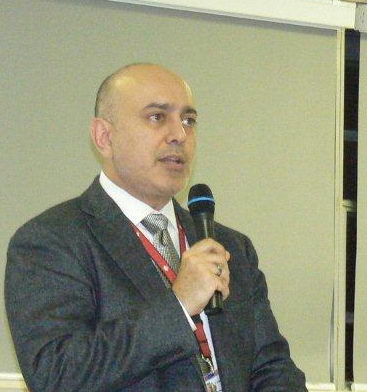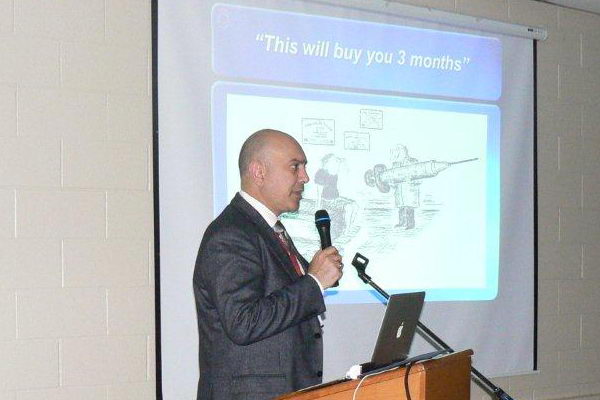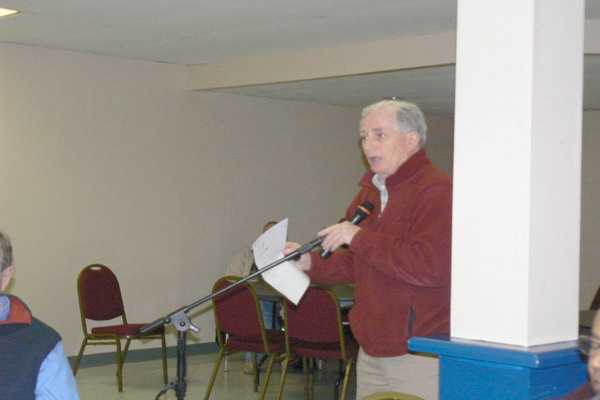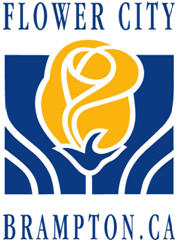
February General
Meeting
|
|
Feb
9th 2010
Us
-Too! Brampton General Meeting
"New Developments in Drug Treatments
for Advanced Prostate Cancers"
by
Dr. Sandy Sehdev

Dr. Sehdev presented a highly detailed and informative
talk on Hormone Therapy, Chemotherapy,
Bone Health and Future Directions in Cancer Treatment Therapies.
The presentation was followed by a good questions and answer period as
well.
Androgen Deprivation Therapy is most commonly
administered when earlier
forms of treatment ( Surgery/Radiation/HIFU, Etc ) have failed to control
the
cancer or when the disease has already spread beyond the prostate gland on
initial diagnosis. By reducing Testosterone levels this treatment can
often control
Prostate Cancer for many years. Various drug combinations and treatment
regimens
can often extend the effectiveness of hormone therapy, but at some point
some
patients stop responding to the treatment. It is thought that in many
cases this is
due to a form of hormone resistant cells becoming more dominant within the
cancerous tissue. This progression can be monitored via PSA levels that
are
low while therapy is still effective and begin to rise if and when it
begins to fail.
At this point in time Chemotherapy may become a viable
treatment option.
Chemotherapy is usually reserved for cases where measurable metastasis is
present or the Gleason Score of the cancer is quite high. Modern
Chemotherapy
while still generating some side effects can be effective in two primary
ways.
It can extend survival rates by controlling the cancer's growth. It can
also improve
quality of life by reducing pain associated with the growth of the cancer.
In the best scenario the treatment can have both of these benefits with
reduced side effects.
Docetaxel is one of the more modern forms of drugs used
for chemotherapy in
prostate cancer. An anti-fungal agent, Ketoconazole in combination with
Hydrocortison
e has also been shown to be beneficial in these same two areas. A person's
general
medical condition may also determine whether chemotherapy is safe or not.
An inactive
person with other medical complications may be much more acutely affected
by
chemotherapy than an active person. The most dangerous potential side
effect of
chemotherapy is a reduced white blood cell count which can leave an
individual more
susceptible to infections. Hair loss, numbness and tingling in extremities
and deformation
of finger and toe nails are other common side effects.



Dr. Sehdev also reviewed Bone Health as it relates to
prostate cancer treatment. While
patients are on hormone therapy they often become susceptible to
Osteoporosis. Vitamin D,
Calcium and Exercise are highly important in this case to maintain bone
health. Complications
from osteoporosis include pain, fractures and spinal cord compression. A
relatively new drug
Zometa has been shown to also be effective in helping to maintain bone
health and lower most
of the effective risks from osteoporosis.
Dr. Sehdev ended his talk with a review of new research
into controlling a major mechanism
of cancer growth, namely angiogenesis. For a cancer tumor to grow, it
requires a steady
supply of nutrients. It manages to obtain these nutrients by stimulating
the growth of blood
vessels around the tumor. Some new drugs are being targeted at blocking
this VegF substance
with an effective trap to contain and neutralize the stimulus.
Thanks Dr. Sehdev!
That was an excellent
and very well received talk.
AUDIO & SLIDES DOWNLOADS
AUDIO:
SLIDES:
PROSTATE CANCER AWARENESS!
Prostate Cancer Canada Network - Brampton
·
Tel: 905- 453-3038 · Fax: 905-840-9474 · Email: info@pccnbrampton.com


